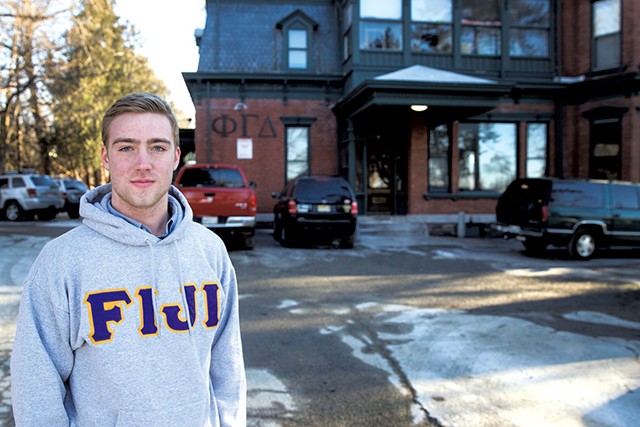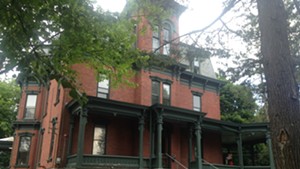
- James Buck
- August Siebs in front of Phi Gamma Delta
No beer bottles were in sight at the Phi Gamma Delta house when a reporter arrived Thursday to discuss the sobering news facing the 10 fraternity and sorority houses affiliated with the University of Vermont. The property tax exemptions on Greek houses are set to expire January 1, 2017. Unless the legislature grants them a reprieve, the houses will owe a combined $350,567 annually in taxes. About a third would go to the City of Burlington, and the rest to the state education fund.
The 700 brothers and sisters at UVM say that would force them to sell the historic properties, which house about 200 of them and are where they all go for meetings and social events. They are rallying, petitioning and lobbying the legislature to pass a proposed bill that would maintain the tax break in an effort to "save Greek life."
Yearly taxes on the stately 13-bedroom mansion that Phi Gamma Delta occupies at the corner of South Willard and Main would come to around $35,000. That would essentially put the chapter out of business, said August Siebs, a 19-year-old sophomore from Herndon, Va., who lives at the house nicknamed Fiji with 18 others. "Most likely we would be able to sustain a couple years here, but then we'd probably have to give up the house that we've had for almost 50 years," said Siebs, who serves as president of UVM's Interfraternity Council.
Greeks were easy targets when the state went looking for new revenues, he said: "We only make the news when something bad happens."
Local frats have indeed generated their share of headlines: Chapters have been suspended and shut down for hazing, drug use and alcohol violations over the years. In 1993, members of Sigma Phi Epsilon were charged with furnishing alcohol to minors after a pledge fell off a cliff and died during a fraternity-sponsored party. In 1990, an intoxicated Kappa Sigma member fell off the fraternity's roof and was fatally impaled on a post. In 2011, the national Sigma Phi Epsilon organization shut down UVM's house after a member conducted a survey asking his brothers whom they would most like to rape.
Fiji president Ian Campbell maintained that the Animal House image is unfair and dated. At his fraternity, anti-hazing and anti-substance-abuse education is part of the programming, he said. "One of the hardest feats we have right now is overcoming those stereotypes," said Campbell, a 21-year-old senior from Media, Pa.
In Burlington, the issue of tax-exempt property is a thorny one that goes beyond Greek houses and their bacchanalian reputations.
About 38 percent of property in the city is tax-exempt, including state, federal and local government facilities, religious institutions, colleges, various nonprofits, and the University of Vermont Medical Center.
According to City Assessor John Vickery, taxing the exempt properties would generate more than $34 million in additional annual revenue, more than $20 million of which would go to the state education fund.
A state commission looked at eliminating various property tax exemptions in 2014, but political support was limited. The legislature ultimately agreed to repeal just one exemption — on Greek properties.
The law grants religious organizations, hospitals and some educational institutions tax exemptions, based on the principle that they provide a public good. But nonprofits fall into a gray area. And because Vermont has a state education-funding system, the Vermont Tax Department has lots of say in the matter.
If the department disagrees with a local decision to grant an exemption, it can send the locality a bill for the money owed the state — even if the city's not collecting it. "Our office doesn't want to fight against the state," Vickery said. "If they say no, and we say yes, we're going to have to go along with no."
Every year, new applications for exemptions come into city hall. Some are approved. Some are denied. A few years ago, Burlington Country Club, which is a nonprofit, applied for a tax exemption. The city said no. "We felt that they didn't meet the public and charitable use exemption," Vickery said. "They didn't push it."
Over the years, local politicians have tried to get some exempt local institutions to pay up. In 1987, then-mayor Bernie Sanders shocked the hospital with a $2.9 million property tax bill. The mayor reasoned that the facility, with a $100 million budget, did not meet the "public good" criteria if it pursued patients for unpaid bills and rewarded executives and physicians with hefty salaries.
The hospital sued, and a judge ruled against the city.
But Sanders and his successors never really gave up. In 1999, the hospital entered a 30-year fee-for-services agreement with the City of Burlington that increases by 2 percent each year. This year, the bill is about $446,000.
Burlington leaders came after the University of Vermont, too, for similar substitute tax payments. UVM has been writing checks for at least 10 years. Under a memorandum of understanding for fiscal year 2016, UVM agreed to pay the city $1.3 million, plus another $81,000 for the University Health Center building.
Champlain College makes what it considers a "voluntary contribution" that totaled $119,000 last year. The college also pays taxes on some of its property. A 1941 law obligates educational organizations to partial taxation on certain acquisitions after that date.
A few of the Greek houses make partial payments under the same law. The annual tax bill for Alpha Gamma Rho is about $11,000; Fiji pays about $12,000.
Neither of those houses wants bigger bills, of course, and the Greeks who aren't paying yet don't want to start — a fact made clear at a March 3 rally in the Dudley H. Davis Center at UVM. About 200 students attended, many of them dressed in suits and ties or blouses and slacks. Speakers from each Greek house outlined their organization's charitable work, and leaders from various nonprofits expressed their thanks in person and in testimonials read aloud.
Rep. Barbara Rachelson (D-Burling-ton), the sponsor of the bill to preserve the tax break for Greek houses, told attendees that the organizations are a training ground for many people who go on to lead philanthropic efforts in Chittenden County. She's seen it firsthand. "I happen to be the director of a nonprofit," said Rachelson, executive director of the Lund family center. "I feel connected to fraternities and sororities on lots of different fronts."
Larry Sudbay, a UVM alumnus who was a member of Sigma Phi, is leading the effort to keep the tax exemption. The president and CEO of SymQuest said losing the exemption would force Greek houses to sell — most likely to UVM or Champlain College. Because the colleges get tax breaks, he argued, the tax revenues would not materialize. To illustrate his point, Sudbay listed eight former Greek properties that the colleges have purchased.
Sudbay told the students that the property taxes would unfairly burden them when they already have big tuition bills. "It's an excise tax on your education," Sudbay said.
Meanwhile, he and other members of the Greek coalition have informed the state's political leaders that they'd be willing to pay something in taxes, just not the full bill.
The offer has not won over Burlington Mayor Miro Weinberger. In an interview Friday, he said the legislature was on the right track when it ended the tax break.
"The fact that a substantial percentage of the city, of the grand list, is tax-exempt is kind of a chronic financial challenge for the city to address," Weinberger said.
The city's current list of projects — from rebuilding the length of the bike path within city limits to fixing roads and sidewalks to restoring City Hall Park — increases the pressure to find revenues.
Weinberger is negotiating with Champlain College and UVM to increase their contributions to the city.
"It's really very specifically around this significant push for new investment in our infrastructure over the next four years," Weinberger said. "If we succeed at the plan, the whole community's going to benefit, including the institutions."
He declined to be more specific about the negotiations.
Today, Burlington takes in a total of $93 million in property taxes on a grand list of property valued at some $3.7 billion dollars.
The city also has payment-in-lieu-of-taxes agreements with other property holders, including the state, the Burlington Electric Department and Burlington Telecom. Often the agreements are crafted as multiyear pacts with clauses for annual increases. The payments tend to be substantially lower than what taxes would be. One plus for the city: The payments are structured as fees for municipal services, so the city doesn't have to share the money with the state education fund.
Back at Fiji, fraternity members pointed to their efforts to maintain the home on the hill built by a local businessman and Civil War Medal of Honor winner, General William Wells. With its 14-foot ceilings, marble fireplaces and elaborately carved wooden staircase, the structure still felt grand, even though there was a bar in one room, a Ping-Pong table in another and a swirl of spaghetti in the catch of the oversize kitchen sink.
Still, the exterior and main floor interior are better maintained than many student rentals in the neighborhood, and the brothers pointed with pride to the portrait of a dour-looking Wells on a wall next to one of the huge windows.
Said Fiji president Campbell: "Place is something that holds value, and this place is important to us."










Comments (12)
Showing 1-12 of 12
Comments are closed.
From 2014-2020, Seven Days allowed readers to comment on all stories posted on our website. While we've appreciated the suggestions and insights, right now Seven Days is prioritizing our core mission — producing high-quality, responsible local journalism — over moderating online debates between readers.
To criticize, correct or praise our reporting, please send us a letter to the editor or send us a tip. We’ll check it out and report the results.
Online comments may return when we have better tech tools for managing them. Thanks for reading.